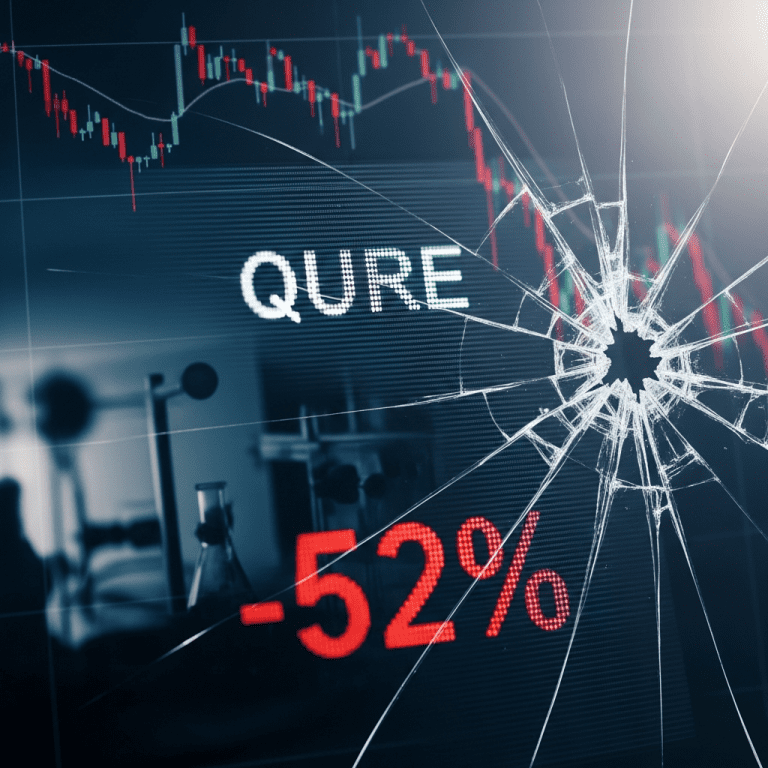UniQure ($QURE) shares nosedived 52% to $4.82 at Tuesday’s open, as the company revealed a possible FDA rejection for its leading gene therapy. The UniQure stock decline FDA scenario caught investors off-guard, raising urgent questions about the firm’s future and sector sentiment.
UniQure Shares Crash 52% After FDA Signals Gene Therapy Risk
UniQure N.V. ($QURE) suffered one of its steepest falls on record, plunging from $10.14 to $4.82 on November 5 amid enormous volume of over 28 million shares—nearly 15 times its 3-month daily average, according to Nasdaq data. The catalyst: UniQure’s SEC filing late Monday warning that the FDA could issue a Complete Response Letter (CRL) for its hemophilia B gene therapy, etranacogene dezaparvovec. The company cited “substantial unresolved questions” in ongoing regulatory correspondence as the primary risk factor. Since the start of 2025, UniQure had already lost 38% of its market cap, but Tuesday’s single-day plunge erased over $400 million in value (Bloomberg, Nasdaq, company 8-K filing, 2025-11-04).
Gene Therapy Sector Faces Renewed Volatility After UniQure Rout
The UniQure stock collapse rippled through the biotech sector, with the Nasdaq Biotechnology Index dropping 1.6% by midday. Competing gene therapy developers like Sarepta Therapeutics ($SRPT) fell 4.9%, and bluebird bio ($BLUE) slumped 6.7%, illustrating renewed skepticism toward regulatory pathways for gene-editing and gene-replacement treatments (FactSet, 2025-11-05). Historically, high-profile gene therapy setbacks—such as Bluebird’s Zynteglo issues in 2022—have triggered multi-week volatility across the life sciences sector. The latest FDA scrutiny also comes as regulators toughen oversight on clinical efficacy and long-term safety, challenging near-term recovery in the gene therapy investment theme (stock market analysis; Reuters, 2025-11-05).
Investor Strategies: Managing Portfolio Risk After UniQure Downturn
With UniQure’s swift collapse and persistent regulatory overhang, investors holding gene therapy and biotech positions face a sharper risk landscape. Short-term traders may see heightened volatility opportunity across sector peers, but long-term holders should reassess weightings in small-cap therapeutics given unpredictable FDA timelines. Diversification into profitable large-cap biopharma—such as Amgen ($AMGN) and Gilead Sciences ($GILD)—can buffer portfolio shocks. Close monitoring of upcoming FDA decisions and trial milestones in gene therapy is advisable, as further negative verdicts could weigh on valuations across the sector. For comprehensive perspectives on sector risk, visit stock market analysis and latest financial news.
What Analysts Expect Next for UniQure and Gene Therapy Stocks
Industry analysts observe that UniQure’s FDA headwinds may set a cautious tone for gene therapy pipeline valuations through early 2026. Market consensus suggests increased regulatory scrutiny—especially regarding long-term durability data—will remain a core hurdle. Investment strategists at major brokerages emphasize watching FDA communications and upcoming advisory committee meetings, as these are likely to shape sector sentiment and capital flows over the next quarter (Bloomberg, Jefferies analyst note, October 2025).
UniQure Stock Decline FDA Decision Signals New Biotech Challenges
The UniQure stock decline FDA development underscores the unpredictability of regulatory paths in advanced therapies. Investors should track FDA adjudications and evolving safety standards, as these will heavily impact biotech risk-reward in 2025 and beyond. This episode highlights the value of rigorous due diligence—and the necessity for diversified strategies as uncertainty persists in cutting-edge sectors.
Tags: UniQure, QURE, FDA, gene therapy, biotech stocks









